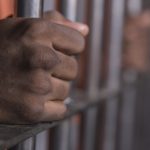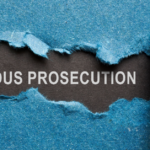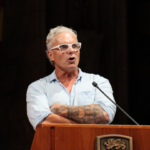Calls to End Laws that Discriminate Against LGBTIQ Teachers

A few years back, high school teacher Craig Campbell received an email from the WA Teacher Registration Board stating that after having worked for two years as a relief teacher at a Baptist college located south of Perth, he’d been removed from the list of available teachers.
And at the time he received the email in 2017, Mr Campbell was well-aware that the school had terminated his employment in such a cold manner because of his sexuality. Indeed, he’d recently informed the college principal that he was in a same-sex relationship.
Under both Western Australian and Commonwealth laws, religious schools are permitted to discriminate against teachers on the basis of their sexuality. And although the school never formally invoked the law, both parties understood what was being implied when he was dismissed.
And as the Morrison government is about to introduce a Religious Discrimination Act that’s set to reinforce existing religious exemptions – if not expand on them – Mr Campbell is speaking out about these prejudicial and harmful laws as part of the National Secular Lobby campaign against them.
A culture of “fear and silence”
“I am unable to make comment about South Coast Baptist College or the reasons for my departure from South Coast Baptist College,” Mr Campbell firstly made clear.
“It’s an isolating and frightening experience that pits teachers against their whole school,” he went on to explain. “The exemptions create a system whereby schools have little accountability for their reasoning and manner for dismissal or discipline, and the individual has little to no recourse.”
“Given the sensitive and private nature of the topic – particularly within conservative religious communities – affected staff are even more unlikely to speak out,” the high school teacher told Sydney Criminal Lawyers.
According to Campbell, “the perceived ‘sexual’ nature” behind the reasons for the terminations – or the alternative, which is “forced closeting” – is “especially magnified” as the teachers involved are working closely with young students.
Having their professionalism questioned in this manner, hinders a teacher’s ability to educate students, he added. And these laws also impact mental health, whether that’s due to dismissal, being closeted, or exclusion from job opportunities at government-funded religious schools.
“We have to question why we don’t hear stories about this happening, because there are certainly LGBTQI teachers working within religious schools,” Mr Campbell said. “The threat either keeps them closeted or something is happening behind the scenes to keep people quiet.”
Nothing renders it unlawful
Section 38 of the Commonwealth Sex Discrimination Act 1984 makes it lawful for religious educational institutions to discriminate against employees, contractors and students based on “sex, sexual orientation, gender identity, marital or relationship status or pregnancy”.
While the Western Australian Equal Opportunity Act 1984 provides in section 73 that religious schools are lawfully permitted to discriminate against employees, contractors and students based on sexual orientation or gender history, amongst other attributes.
“When schools don’t actively challenge these exemptions,” Mr Campbell stressed, “they send the message to all staff and students that LGBTQI individuals are lesser and not worthy of protection, either within that school community or wider Australian society.”
Rallying against equal rights
The Ruddock religious freedoms review was established by Malcolm Turnbull just a week following the return of the Yes vote on marriage equality. It was an attempt to appease religious right politicians who opposed same-sex marriage becoming legal.
Leaked to the press in October last year, the review recommendations suggested the religious exemptions that are contained in the Sex Discrimination Act be reassessed, not with a view to repealing them, but to make it clearer they’re “founded in the precepts of the religion”.
The realisation the law allows religious schools to expel students and sack teachers based on their sexuality lead to strong public outcry. And after he initially defended the laws, PM Scott Morrison said he’d repeal the provision pertaining to students, although he remained silent on teachers.
However, despite a feeble attempt by Mr Morrison to repeal the law targeting LGBTIQ students, it remains in place. And instead, the PM announced last December that he’d decided to run with another review recommendation, which is passing a Religious Discrimination Act.
Legislating further privilege
While the Australian Christian Lobby may be waiting on the tabling of the Religious Discrimination Act with fervour, the wider community are somewhat suspect about why this legislation to protect religious people from discrimination, as well as their right to discriminate, is being prioritised now.
And while Morrison has pointed to the need to protect religious freedoms in a multicultural society, the actual push for these laws is being led by an all-Anglo Australian chorus line focused solely on protecting the majority religion in this country: Christianity.
Macquarie University Professor Marion Maddox has pointed out that over past decades when the religious freedoms debate has been raised, the religious right has knocked it down. And it seems only now that they feel their privilege is under threat that they want to further enshrine it in law.
Mr Campbell emphasised that while religious freedom is important, as far as he can see the proposed Act “is a response to appease” Morrison’s “voter base that lost in the plebiscite”.
And former NSW Council for Civil Liberties president Stephen Blanks made the observation when the current debate commenced that rather than establishing legislation that singles out one right over all others, the government should look at a bill of rights that protects all human rights under the law.
Repeal the right to discriminate
Of course, one very obvious reason that the religious freedoms discussion has gotten to the point where federal parliament is about to debate religious protections is that the nation has a Pentecostal PM, who wears his faith on his sleeve.
And when the nation revealed it’s outrage over the pre-existing exemption laws, rather than acknowledge how wrong they are, he found it hard to hide his smile as he repeatedly told reporters that these exemptions were already law, so that was that.
But, despite the moves to reinforce these rights to discriminate under new legislation, it’s certain that most people want to see the ability to discriminate against teachers and students abolished. And as Campbell underscored these schools “in a large way” are taxpayer funded.
“The complexities of religious freedom in all spheres is not my concern, but government sanctioned discrimination within schools is,” Mr Campbell concluded.
“The loopholes are out-of-step with public sentiment and broader Australian values. Remove them and we help to build safe and healthy learning environments for all staff and students.”







